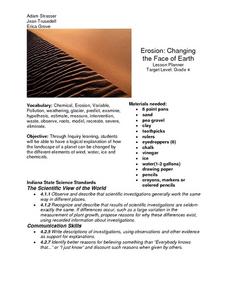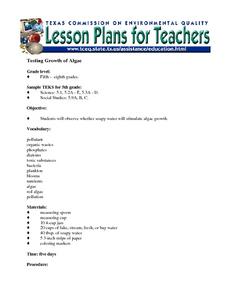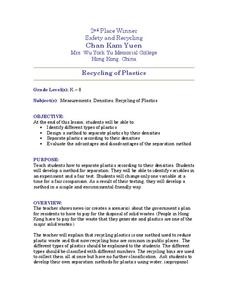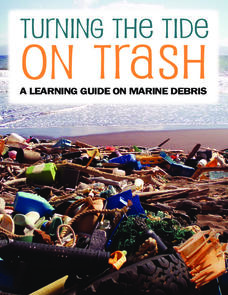Curated OER
Erosion: Changing the Face of Earth
Fourth graders explore how the landscape of the planet can be changed by different elements of wind, water, ice and chemicals through hands-on activities. They examine pictures of areas around town and discuss anything they think is out...
Curated OER
Time Lapse Seed Germination with the QX3 Intel Digital Microscope
Students use the time-lapse feature of the QX3 Intel Digital Microscope
to observe germination of seeds. They use the QX3 Intel Digital microscope to create time lapse video films of seed germination experiments.
Curated OER
Making soap you can use
Those textbook experiments are no good. Using this simple method you can make a real bar of soap. It's
Curated OER
Testing Growth of Algae
Young scholars participate in an experiment in which they test the growing rate of algae. They test the algae in different elements recording their observations. They share their results with the class and discuss.
Curated OER
EggCELLent Diffusion
Students examine and discuss the concepts of diffusion and osmosis. They observe the effects of diffusion on eggs by recording the change in an egg's size and the amount of liquid substance that remains.
Curated OER
Microorganism Multiplication
Sixth graders explore biology by viewing video clips in class. In this microorganism identification lesson, 6th graders identify the types of organisms that can feed small animals such as algae and protozoans. Students view video clips...
Curated OER
Think Green
Students experience and practice compositing and recycling through hands-on-activities. They distinguish between which items from their trash can be recycled, composted and reused. The process for making recycled paper is also covered in...
Curated OER
Local Environmental Issues: Pollution
Third graders discuss the ways in which human interaction with the environment and production of waste products contribute to pollution. Through a pollution demonstration, they explain how various groups of plants and animals can be...
Curated OER
Sodium Bentonite Swelling Index
Students research the effects of sodium bentonite being combined with water. They discuss the reasons why this chemical is used in landfills. They measure the swelling index of sodium bentonite clay.
Curated OER
Cation Separation and Identification
Students conduct an experiment in which they systematically separate cations from a mixture of substances. They use the following types of reactions to do so: precipitation, acids and bases, oxidation and reduction. They compare a...
Curated OER
Selecting Soil Organisms in Compost
Students demonstrate that many of the enzyme systems needed to break down--and therefore clean up-society's wastes already exist in nature among the decomposers. They select the best starch-munching organisms by altering the environment...
Curated OER
Recycling of Plastics
Students separate plastics according to their densities, develop a method for separation and identify variables in an experiment and a fair test, changing only one variable at a time for a fair comparison. After testing, they develop a...
Curated OER
It's A Gas
Students build an organic waste methane generator and learn by running a scientific experiment to see what happens when people alter nature's way of recycling.
Curated OER
Chado: The Way of Tea
Students participate in a tea ceremony in order to explore the multisensory experience that can be enjoyed as a bowl of tea and the various tea utensils are viewed, contemplated and experienced in this High School lesson.
Curated OER
The Principles Of Composting
Students put items in a plastic bag and watch the effects of composting. While completing the experiment, students answer questions and ask permission to start their own compost pile at home.
Curated OER
Paper Chromatography
Students participate in an experiment determining how to separate a mixture of dyes in water-soluble ink.
Curated OER
Journaling
Students explore journal writing. In this writing lesson plan, students are given writing prompts such as "how the choices I make affect our water quality?" and use critical writing skills to express their feelings in a journal. There...
Curated OER
Soybeans in Space
Students work together to design an experiment that compares and contrasts differnet plant cultivation systems. In groups, they evaluate the results of the experiment to discover if the cultivation system could be used in space. They...
Curated OER
Energy Audits for the Elderly
Students perform experiments to determine the nature of energy particularly in air, light and water. They conducted an energy audit using the Energy Audit Checklist and by looking at the school's bills for gas and power.
Curated OER
De"compost"ition Activity
Students investigate the decomposition process and the parameters which influence the rate at which it occurs. They design a "controlled" experiment by comparing decomposition rates between two compost piles. Analysis questions include...
Curated OER
Dissolved Oxygen in an Aquatic Ecosystem
High schoolers explain why dissolved oxygen is important in aquatic ecosystems. They evaluate the optimal dissolved oxygen levels for living organisms.
NOAA
Turning the Tide on Trash: A Learning Guide on Marine Debris
The lessons in this learning guide are designed to increase youngsters' awareness of the impacts of marine debris and to teach them about pollution prevention techniques. This fabulous, 30-page packet is chock full of important...
Cornell University
Predicting Chemical Reactions
Prove the Law of Conservation of Mass through a lab investigation. A well-designed lesson asks groups to combine materials and monitor indicators for chemical reactions. Measuring the mass of the reactants and products allows individuals...
Cornell University
Chemical Reactions
Investigate the Law of Conservation of Mass through a lab exploration. Individuals combine materials to initiate chemical reactions. They monitor for signs of reactions and measure the masses before and after the reactions for comparison.

























